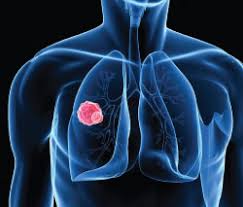
Diagnosed with Cancer? Your two greatest challenges are understanding cancer and understanding possible side effects from chemo and radiation. Knowledge is Power!
Learn about conventional, complementary, and integrative therapies.
Dealing with treatment side effects? Learn about evidence-based therapies to alleviate your symptoms.
Click the orange button to the right to learn more.
- You are here:
- Home »
- Blog »
- Lung Cancer »
- Stage 4 Lung Cancer- Out of the Box Thinking
Stage 4 Lung Cancer- Out of the Box Thinking

“Based on this mechanism, curcumin has potential as a chemosensitizer for carboplatin in the treatment of patients with Non Small Cell Lung Cancer “
I am a long-term survivor of a blood cancer called multiple myeloma. I’m mentioning this because myeloma and non-small cell lung cancer (NSCLC) are both cancers with dismal five-year survival rates. If lung cancer patients don’t think outside the conventional oncology box their prognosis is limited.
I’m not talking about weird therapies that promise a silver bullet cure. I’m talking about “integrative” therapies. This is to say therapies that are supported by research and experience. The chemotherapy regimens discussed below-carboplatin and/or paclitaxel can kill lung cancer.
However these two chemotherapies often cause nasty side effects and often cause resistance by the NSCLC that they are supposed to kill.
Further, I’m not talking about looking only at non-conventional therapies. For example, NSCLC patients should see if Immunotherapy can help them. And if you are considering immunotherapy, also consider a complementary therapy shown to possibly enhance your immunotherapy.
Or conventional surgery or radiation can debulk your cancer to ease symptoms and add to your quality of life. But what I am saying, is that my experience taught me that conventional oncology is limited when it comes to cancers such as NSCLC and MM.
I am both a cancer survivor and cancer coach. Scroll down the page, post a question or comment and I will reply to you ASAP.
Hang in there,
David Emerson
- Cancer Survivor
- Cancer Coach
- Director PeopleBeatingCancer
Recommended Reading:
- Lung Cancer and CT Scans-Are they worth it?
- Curcumin, Integrative Therapies, Can Overcome Multidrug-Resistance In Lung Cancer
- Metformin Improves Lung Cancer Survival by 66%
Curcumin sensitizes human lung cancer cells to apoptosis and metastasis synergistically combined with carboplatin.
“Although carboplatin is one of the standard chemotherapeutic agents for non-small cell lung cancer (NSCLC), it has limited therapeutic efficacy due to activation of a survival signaling pathway and the induction of multidrug resistance.
Curcumin, a natural compound isolated from the plant Curcuma longa, is known to sensitize tumors to different chemotherapeutic agents.
The aim of this study is to evaluate whether curcumin can chemosensitize lung cancer cells to carboplatin and to analyze the signaling pathway underlying this synergism. We investigated the synergistic effect of both agents on cell proliferation, apoptosis, invasion, migration, and expression of related signaling proteins using the human NSCLC cell line, A549. A549 cell was treated with different concentrations of curcumin and carboplatin alone and in combination.
Combined treatment with curcumin and carboplatin inhibited tumor cell growth, migration, and invasion compared with either drug alone. Matrix metalloproteinase (MMP)-2 and MMP-9 were more efficiently downregulated by co-treatment than by each treatment alone. mRNA and protein expression of caspase-3 and caspase-9 and proapoptotic genes was increased in cells treated with a combination of curcumin and carboplatin, whereas expression of the antiapoptotic Bcl-2 gene was suppressed.
Co-treatment of both agents substantially suppressed NF-κB activation and increased expression of p53. Phosphorylation of Akt, a protein upstream of NF-κB, was reduced, resulting in inhibition of the degradation of inhibitor of κB(IκBα), whereas the activity of extracellular signal-regulated kinase (ERK1/2) was enhanced. Our study demonstrated that the synergistic antitumor activity of curcumin combined with carboplatin is mediated by multiple mechanisms involving suppression of NF-κB via inhibition of the Akt/IKKα pathway and enhanced ERK1/2 activity.
Based on this mechanism, curcumin has potential as a chemosensitizer for carboplatin in the treatment of patients with NSCLC…:


